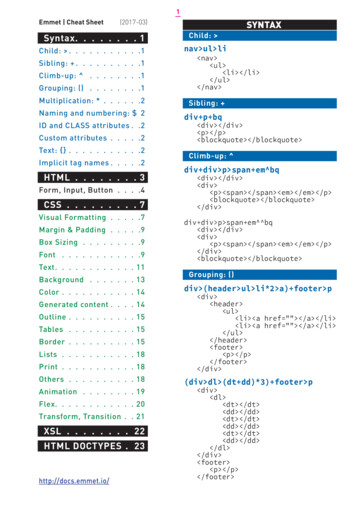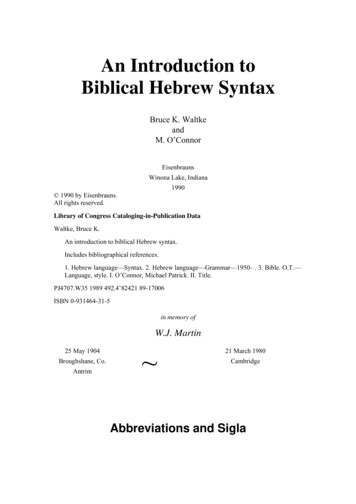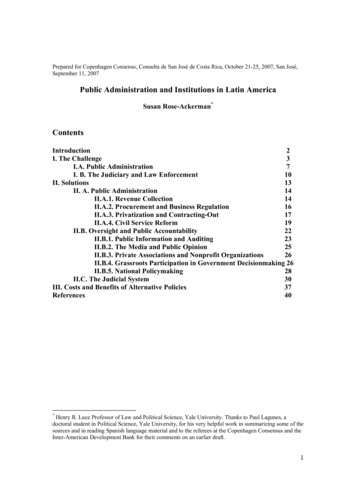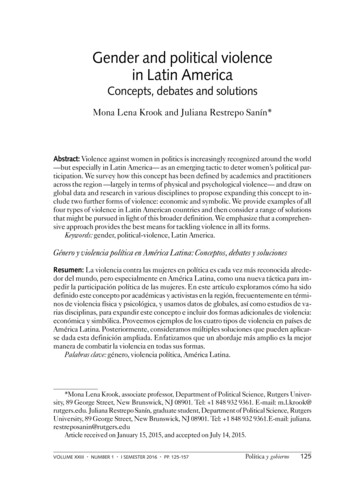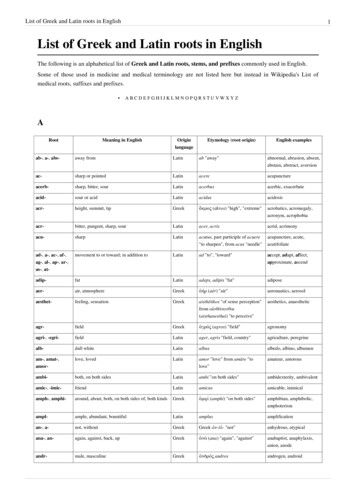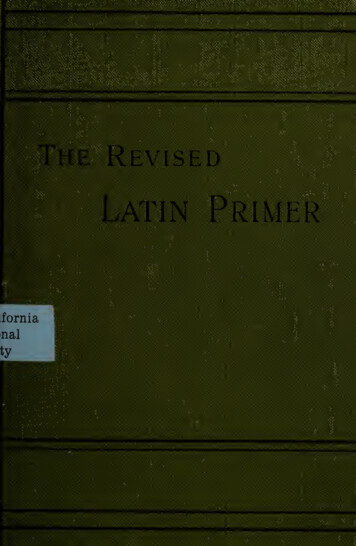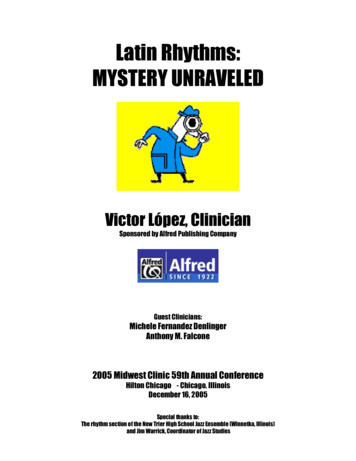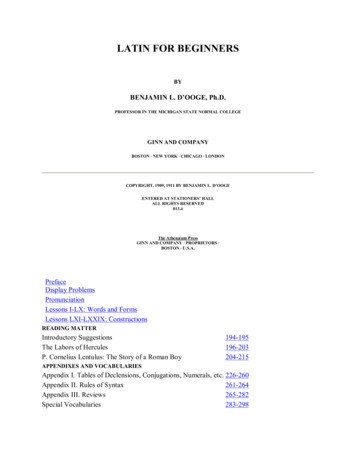
Transcription
Resource Book IIIGRAMMARAND SYNTAXKMHS LATIN
Chapter 1THE NOMINATIVECASE
SECTION 1Subject NominativeThe nominative case is used for the subject of a sentence.The subject is the focus of the sentence. In most sentences,the subject is the person or thing doing the action of theverb. The subject is often, but not always, the first word inthe sentence.In the passive voice, the subject receives the action of theverb.Example:Pila ā puellīs iaciētur.The ball will be thrown by the girls.Examples:Puellae pilam iaciunt.Not every sentence in Latin will have a stated subject. Sincethe person and number of the subject can be determinedfrom the ending on the verb, a personal pronoun is not always necessary for the subject.The girls throw the ball.Lupus in silvā cēlābat.The wolf was hiding in the woods.Examples:Raedārius raedam necessaryglegenter agit.Herī sub arbore legēbam.The coachman drives the carriage carelessly.Yesterday I was reading under the tree.2
Crās ad Forum ambulābimus.Tomorrow we will walk to the Forum.3
SECTION 2Predicate NominativeA predicate nominative is a word in a sentence that is linkedto the subject. It can be a noun or an adjective. When it is anadjective, it is often referred to as a predicate adjective. Thesetwo words are always joined by a linking verb, most commonly the verb “to be.”Examples:Puella est Cornelia.The girl is Cornelia.Cornelia est laeta.Cornelia is happy.Cicerō ōrātor praeclārissimus factus est.Cicero became a most famous orator.4
Chapter 2THE GENITIVECASE
SECTION 1Genitive of PossessionThe genitive of possession is the most common use of thegenitive. It is used to show possession or ownership of someone or something. In English, possession is identified in thefollowing two ways:Servī clāmōrem vīlicī audiunt.The slaves hear the shout of the overseer.The slaves fear the overseer’s shout.A word that comes after “of ”Servus rāmīs arborum ascendit.A word that contains “ ‘s “ after itThe slave climbs the branches of the trees.The slave climbs the tree’s branches.In Latin the genitive case is used instead of either an apostrophe or a preposition, although either one of these is an acceptable translation for a genitive of possession. Usually thegenitive of possession comes after the noun that it owns.ExamplesMarcus rotās raedae videt.Marcus sees the wheels of the carriage.Marcus sees the carriage’s wheels.6
SECTION 2Partitive GenitiveThe word in the genitive case is used here to distinguish thewhole of something in relation to a part that is being considered. When translated into English, the word “of ” may beused or it may be implied.Examples:Servius aliquid litterārum legēbat.Servius was reading some (of the) letters.Lucius nihil perīculī conspicit.Lucius catches sight of no danger (nothing of danger).Princeps satis mīlitum nōn videt.The emperor did not see enough (of the) soldiers.7
SECTION 3Subjective and Objective GenitiveBoth the subjective and objective genitives are used with anoun that implies an action of some time.Orātor dē odiō Caesaris in Pompēium in Senātūdīcēbat.The orator was speaking of the hatred of Caesar againstPompey in the Senate.Subjective GenitiveWhen the noun in the genitive case can be seen to be thesubject of the action implied in the noun, it is said to be asubjective genitive.Objective GenitiveWhen the noun in the genitive case receives the action implied in a verbal noun, it is considered an objective genitive.Sometimes the English preposition “for” may be used intranslation.Examples:Senātōrēs adventum Tiberiī vident.The senators see the arrival of Tiberius.Examples:Servī magnum amōrem cibī habent.Cursus lupōrum Antoniam terret.The slaves have a great love of food.The running of the wolves frightens Antonia.8
Mīlitēs fortēs metum mortis nōn habuērunt.The brave soldiers did not have a fear of death.Propter cupiditātem aurī, praedōnēs civēs arripiunt.Because of their greed for gold, the soldiers seize citizens.9
SECTION 4Genitive of DescriptionAlso known as the genitive of characteristic, the genitive ofdescription is a noun in the genitive case modified by an adjective that describes another noun.Examples:Scīmus eum esse virum magnae probitātis.We know that he is a man of great honesty.Livia, fēmina magnae sapientiae, erat uxor Augustī.Livia, a woman of great wisdom, was the wife ofAugustus.Puer fortis murum decem pedum ascednere potuit.The brave boy was able to climb a wall of ten feet.10
Chapter 3THE DATIVECASE
SECTION 1Dative Indirect ObjectThe person indirectly affected by the action of a verb of giving, showing, or telling is called the indirect object. It may betranslated with the prepositions, “to” or “for.”Examples:Māter pecūniam mercātōrī dāre nōn vult.The mother does not want to give money to the merchant.The mother does not want to give the merchant money.Puella pictūram suō frātrī dēmonstrābit.The girl will show the picture to her brother.The girl will show her brother the picture.Pater longam fābulam līberīs narrāvit.The father told a long story to the children.The father told the children a long story.12
SECTION 2Dative of ReferenceThe person to whose advantage or disadvantage an action isperformed is called the dative of reference. It may be translated with the preposition “for” or no preposition.Examples:Māter cibum familiae coquit.The mother is cooking dinner for the family.The mother is cooking the family dinner.Iānitor iānuam hospitibus aperuit.The doorkeeper opened the door for the guests.Ancilla villam dominae purgāvit.The slave woman cleaned the country house for the mistress.13
SECTION 3Dative with Intransitive VerbsSome particular verbs take a dative indirect object in Latinrather than an accusative direct object as they do in English.Many of these verbs take the dative because they are considered to affect the object only indirectly. Some examples are:Praedōnēs bonīs civibus saepe nocent.Robbers often hurt good citizens.noceō, nocēreto harm, to be harmful toMagister miserō discipulō nōn crēdidit.faveō, favēreto favor, to be favorable toThe teacher did not believe the wretched pupil.confidō, confidere to trust, to give trust toWhile many of these verbs appear to be transitive in theirEnglish translation, to the Romans they were considered intransitive, and they must be treated as such. It is important tomemorize the vocabulary entries for these verbs and pay attention to special notes, such as that they require a dative object.Examples:Dominus scelestō vilicō nōn confidit.The master does not trust the wicked overseer.14
SECTION 4Dative with Impersonal VerbsCertain impersonal verbs are followed by the dative of theperson or persons involved.Examples:Nōn licet līberīs vigilāre ad mediam noctem.It is not be allowed for the children to stay awakeuntil midnight.The children may not stay awake until midnight.Necesse est servīs labōrāre in agrīs.It is necessary for the slaves to work in the fields.15
SECTION 5Dative of the PossessorThe dative case is used with the verb “to be“ to show possession. The possessor is put into the dative and the thing possessed is the subject of the verb “sum” and so put into thenominative.Example:Canis magnus parvō puerō fuit.The small boy has a big dog.Mīrus liber mercātōrī est.The merchant has an amazing book.Molesta vox īrātae mātrī erat.The angry mother has an annoying voice.16
SECTION 6Dative of Agent with the Passive PeriphrasticWhen using the passive periphrastic, the dative case is usedfor agency rather than the ablative. It is used for both peopleand things, and not preposition is required.Examples:Hoc mihi faciendum erat.This had to be done by me.I had to do this.Liber puerō legendus est.The book must be read by the boy.The boy has to read the book.Fābula mīlitī narranda est.The story must be told by the soldier.The soldier has to tell the story.17
Chapter 4THE ACCUSATIVECASE
SECTION 1Accusative Direct ObjectThe direct object of an active verb is the person or thing thatreceives the action of the verb.Examples:Puellae pilam iaciunt.The girls throw the ball.Insulam videō.I see the island.Quis speculum habet?Who has the mirror?19
SECTION 2Accusative Object of a PrepositionThe accusative case is used after certain prepositions such asapud, per, ad, prope, trans, circum, etc. Many of these prepositions have to do with motion toward something or proximity.Examples:Trans rīvum natāmus.We swim across the stream.Mīlitās ad pontem current.The soldiers will run to the bridge.Omnēs prope arborem sedētis.You all sit near the tree.20
SECTION 3Subject AccusativeIn an indirect statement, the subject of the infinitive is alwaysaccusative. It is the object of the main verb of the sentence.Examples:Pater putāvit fīlium dormīre.The father thought that the son was sleeping.Patrēs semper crēdunt suōs līberōs dormīre.The parents always think that their children are sleeping.Puella dīcit sē librum lectūram esse.The girl says that she will read the book.21
SECTION 4Accusative of Motion TowardThe accusative case is used when the subject is approachingor moving toward someone or something. In many cases thisrequires the use of a preposition in Latin, but when the object of the English preposition is the name of a city, town,small island, or the Latin words domus or rus, the prepositionis omitted, but the object is still in the accusative case.Examples:Puella domum ambulat.The girl walks home.Līberī ad villam currunt.The children run toward the country house.Canis in piscīnam salit.The dog jumps into the fishpond.22
SECTION 5Accusative of Duration of TimeThe accusative case is used to show the length of time thatan action takes. There is no preposition used with this accusative.Examples:Puerī decem hōrās dormient.The boys will sleep for ten hours.Tōtum diem per Forum amblāvī.I walked through the Forum for the whole day.Servus in agrīs octō annōs labōrābat.The slave was working in the fields for eight years.23
Chapter 5THE ABLATIVECASE
SECTION 1Ablative Object of a PrepositionThe ablative is often used as the object of certain prepositions. Many of these prepositions have to do with motionaway from or separation from something or location. It is important to always memorize which case follows a particularpreposition.Examples:Pater ē Cūriā ambulat.Father walks out of the Curia.Ōrātor dē lēgibus novīs dīcēbat.The orator was speaking about the new laws.Līberī in villā manēre nolunt.The children do not wish to remain in the villa.25
SECTION 2Ablative of MannerThe ablative of manner shows the way in which an action isdone. In some ways it is very similar to using an adverb.Sometimes this ablative will be introduced by the prepositioncum, but not always. Often cum is used when the noun ismodified by an adjective, and in these cases if often comes between the noun and adjective.Examples:Dominus servum īrā verberat.The master beats the slave with anger.Puella magnō cum gaudiō cantat.The girl sings with great joy.Poēta arte scrībit.The poet writes with skill.26
SECTION 3Ablative of Instrument/MeansThere are two different ways to use the ablative ofinstrument/means. With either an active or a passive verb itis shows the physical utensil used to complete the action ofthe verb. The ablative of instrument/means never uses apreposition.The ablative of instrument/means can also be used with tehpassive voice to show the physical object, emotion, or ideathat does the action of a passive verb to the subject. Again,no preposition is used.Examples:Examples:Quod princeps īrā commovēbatur, omnēs hostēsnecāvit.Mīles hostem gladiō necāvit.The soldier killed the enemy with a sword.Because the emperor was being moved by anger, he killed all theenemies.Servus ignavus ā dominus baculō verberātus est.Ille homō lapide ingentī oppressus est.The lazy slave was beaten by the master with a stick.That man was crushed by a huge stone.Cicerō Catilīnam multīs ōrātiōnibus damnāvit.Senātor scelestus cupiditāte certē dēlēbitur.Cicero condemned Catiline with many speeches.The wicked senator will certainly be destroyed by greed.27
28
SECTION 4Ablative of Time WhenThe ablative of time when shows when an action takes place.This use of the ablative does not include a preposition inLatin.There is a specific type of ablative of time when called theablative of time within which. This gives a range of time during which the action may take place. Again, no Latin preposition is used.Examples:Examples:Primā luce ad oppidum hostium discedēmus.Paucīs hōrīs senātōrēs ē Cūriā exībunt.At dawn we will depart for the enemies’ town.Within a few hours the senators will exit from the SenateHouse.Tertiō diē pater meus ab urbe redīvit.On the third day my father returned from the city.Omnēs hostēs in hāc provinciā tres annīs vincentur.All the enemies in this province with be conquered within threeyears.Familia in villā rūsticā aestate habitat.The family lives in the villa in the summer.Compluribus diēbus princeps epistulās ad amicōssuōs mittit.Within a few days the emperor sends letters to his friends.29
SECTION 5Ablative of LocationThe ablative of location shows were the action of the verbtakes place. It uses prepositions such as “in” or “sub.” If thelocation is the name of a city, town, small island, or thewords domus or rus, the locative case is used in place of theablative of location.Examples:Amīcō meō in Forō herī occurrī.I met my friend yesterday in the Forum.Puellae sub arbore sedēre et legere amant.The girls love to sit and read under the tree.Multa vehicula in Viā Appiā vīdimus.We saw many vehicles on the Appian Way.30
SECTION 6Ablative of Place from WhichThe ablative of place from which is used to show from wheresomething is coming. Unless the place is the name of a city,town, small island, or the word domus or rus, a preposition isused. Common preposition used with this ablative are “a,ab,”“ē, ex,” and “de.”Examples:Civēs ab aedificiō ardente currēbant.T
In Latin the genitive case is used instead of either an apostro-phe or a preposition, although either one of these is an ac-ceptable translation for a genitive of possession. Usually the genitive of possession comes after the noun that it owns. Examples Marcus rotraedae videt. ās Marcus sees the wheels of the carriage. Marcus sees the carriage’s wheels. Serv ī clāmōrem v lic audiunt. The .
